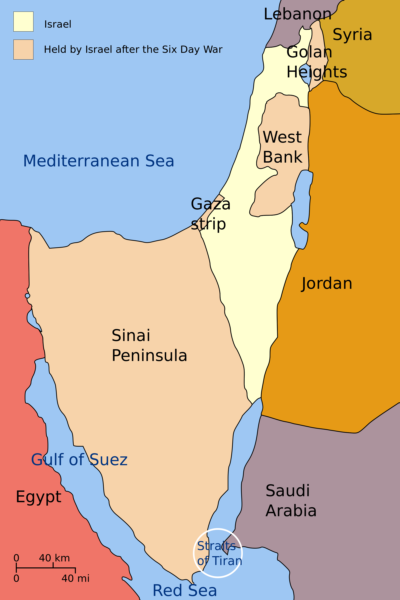Israel’s Six-Day War: How The Post Saw It 50 Years ago

The world was stunned when Israel defeated three armies in just six days.
Until June of 1967, many people had worried that Israel would eventually be crushed by the hostile nations surrounding it.
The Jewish state had long been threatened by its neighbors Jordan and Syria. In May of 1967, president of the United Arab Republic (now Egypt) Gamal Nasser stepped up the pressure. He succeeded in getting the United Nations to remove the Emergency Force guarding Egypt’s border with Israel. Four days later he blocked all shipping in the Gulf of Aqaba heading to Israel’s southern port. Within eight days, King Hussein of Jordan signed a mutual defense pact with Egypt.
Seeing signs of an impending attack on three fronts, Israel took preemptive action on June 5. It launched air attacks that destroyed the air forces of Egypt and Syria. Without air support, both nations’ forces were left vulnerable to the Israeli army. In the following days, Israel captured the Gaza strip and all of the Sinai Peninsula to the eastern bank of the Suez Canal.

Also on June 5, Israel launched a counterattack on the Jordanian forces shelling West Jerusalem. They drove the Jordanians out of East Jerusalem and most of the West Bank.
By June 7, Israel and Jordan were ready to accept a UN-brokered cease-fire. Egypt joined the cease-fire the next day.
But Syria continued to fire on villages in northern Israel. Israel attacked the Syrians on June 9 and captured the Golan Heights after heavy fighting. Syria accepted the cease-fire on June 10.
Americans who sympathized with Israel and wanted to see the Jewish state survive were delighted with the news. And the victory pleased Americans who love a story of the underdog beating the oversized bully.
But there were some in the U.S. who weren’t quite as jubilant. Legendary correspondent Stewart Alsop accurately predicted a future mid-East stalemate, as he wrote in this 1967 editorial:
The Jam We Are In
By Stewart Alsop
July 29, 1967There is an erosion of confidence that you can almost smell, these days, in Washington’s hot, humid air. The Washington mood is a bit like that expressed in the sad little ditty unhappy children used to recite: “Nobody loves me, everybody hates me, goin’ out in the garden and eat worms. . . ,”
Our side won the Middle Eastern war, and for a few days after the brilliant Israeli victory there was a brief euphoria in official Washington. Since then, the fact has become increasingly clear that Israel’s victory was by no means necessarily a victory for the United States. For it has also become increasingly clear that there has never been a time since the last world war ended when the United States has been more nearly alone in the world.
Hardly anybody loves us, and a great many people hate us. Even the Israelis by no means love us. As several correspondents have reported from the scene, the Israelis have little admiration for this country and no sense of gratitude, and regard U.S. policy as feeble and vacillating.
The Arabs, of course, hate us. This hatred is generally dismissed in this country as mere hysteria, fanned by vicious propaganda. It is that, but it is more than that. In order to make their amazing little state viable in 1948, the Israelis forced hundreds of thousands of Arabs out of Arab cities like Jaffa and Haifa, and off the land they had tilled for centuries. Now it seems likely that the Arab refugees of 1948 will be joined in their filthy camps by tens of thousands of new refugees from Old Jerusalem and the land west of the Jordan. Is it really very surprising that the Arabs hate the Israelis? And is it any wonder that the Arabs hate the United States, as the sponsor and protector of Israel, almost more than they hate Israel itself?
In the aftermath of the six-day war, there was some hope in official Washington that the Soviets would work “in parallel” with the United States to damp down the Middle-Eastern hatreds and achieve a lasting settlement. President Johnson and Premier Kosygin did not come to blows at Holly Bush, but they came to no agreement either, and since then the hope has been dying. It seems much more probable that Soviet policy was accurately predicted by an unnamed Soviet official (probably the Russian ambassador in Paris) who was quoted as follows in the French weekly, Le Nouvel Observateur:
“The diplomatic and political battle we are going to wage at the side of the Arabs . . . will be very hard. We will blackmail the Americans with respect to their oil interests and their shipping in the Suez Canal . . . We will lead an incessant propaganda campaign among the young generations [of Arabs| against the cowards, the opportunists and the collaborators of the Anglo-Americans. . . .”
In this battle, Arab hatred will be a most useful weapon. And the stakes are high. The Israelis are brave fighters, but the Arabs outnumber them by more than 15 to 1. and they are sitting on the world’s greatest proved reserves of oil in what is historically one of the world’s greatest strategic land areas.
Moreover, in their “diplomatic and political battle” against the “Anglo-Americans,” it is now clear, the Soviets will have an enthusiastic ally in Charles de Gaulle’s France. Official Washington was hardly surprised when de Gaulle refused to join the consortium to assert the right of peaceful passage in the Gulf of Aqaba, or when he cut off the supply of arms to France’s former ally, Israel.
But there was surprise—and a good deal of rage—when it was learned that two French oil companies, with official encouragement, had attempted to move in on the Anglo-American oil interests in the oil-producing Arab countries. “If de Gaulle really does that,” said one normally unemotional American official, “we ought to break diplomatic relations with Paris.”
It has taken a long time, but the conclusion is at last being forced upon the American Government that de Gaulle really does regard the United States not only as an enemy but as the enemy. The final rupture by de Gaulle of the French-American alliance has undermined the whole American system of alliances.
NATO may be a long time a-dying. but it is dying surely, killed by de Gaulle. The German-American alliance, once rock-firm, is seriously enfeebled. The Germans, and the Japanese and the Italians as well, may join with the French in the assault on the Anglo-American oil interests
in the Middle East. The British, alone among our major allies, supported the project to assert the right of passage in the Gulf of Aqaba.
If, as a consequence of joining this country in that attempt, the British lose their oil holdings in the Arab countries, it will be a near-total economic catastrophe for them. They may be so enfeebled that they will have no choice but to crawl into the Common Market on hands and knees, on de Gaulle’s terms. De Gaulle’s basic condition, of course, is the death and public burial of the Anglo-American alliance. If that alliance dies, the United States will indeed be alone in the world, and this is one reason for the erosion of confidence you can smell in Washington’s air. The other, of course, is Vietnam.
“In a way,” one high official has remarked privately, “we were as wrong about Vietnam as about the Bay of Pigs.” He did not mean that this country was necessarily wrong to intervene in Vietnam. He did mean that the cost of intervention, in casualties, in expenditures, in military-force levels, and above all in the time required to achieve a settlement, was vastly underestimated. The awful thought that an acceptable settlement may be unachievable, and the war unwinnable, is beginning to occur, even to former official optimists.
In short, this country is in a jam all over the world. The jam we are in could be worse. It would be worse if Nasser were presiding in triumph over Tel Aviv, or Ho Chi Minh over Saigon, for example. But it is a very bad jam all the same, and we won’t get out of it by going out in the garden and eating worms. The jam we are in requires facing up to some hard questions. For example, if de Gaulle is determined to treat us as an enemy, should we not treat him likewise? What price will we pay to keep Britain out of the Common Market, and thus preserve the only alliance we have that is worth preserving? And is more of the same really all we can do in Vietnam?
The trouble is that to the people who should be asking such questions, the asking itself is a confession of failure. Many of these people are brilliantly able. But perhaps new men are needed to do the new thinking which now so clearly needs to be done.